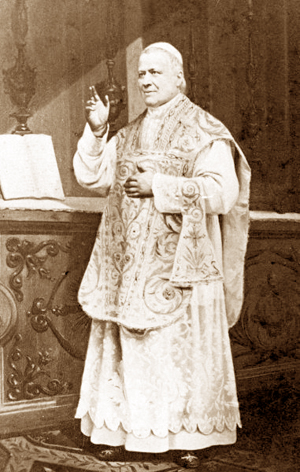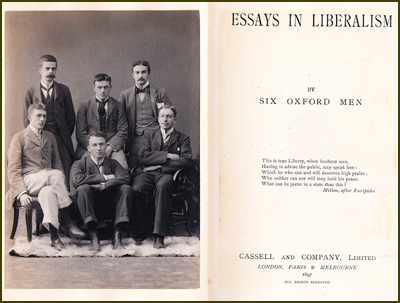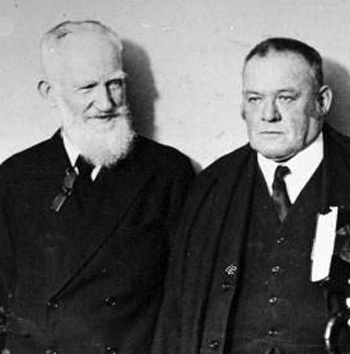 |
Book Reviews
Belloc vs Sarda y Salvani:
Conflicting Views on Liberalism
Patrick Odou
Comparative book reviews of Liberalism Is a Sin by Felix Sarda y Salvani, Rockfort: TAN, 1993 & of The Liberal Tradition by Hilaire Belloc, in Essays in Liberalism, London, Paris & Melbourne: Cassell, 1897.
In 1886 the book El Liberalismo Es Pecado (Liberalism Is a Sin) was published in Spain written by Fr. Felix Sarda y Salvany, an ultramontane priest from Barcelona. (1) It is one of the best books on Liberalism you will ever read and I encourage every Catholic to study it and have a copy in his personal library.
Attacks from liberal clergy against it by a bishop and a priest had the good effect of producing a letter of approval for Fr. Sarda’s work by the Holy See.
This letter from the Sacred Congregation of the Index was written on January 10, 1887. In it Fr. Sarda received “great praise for his exposition and defense of the sound doctrine therein set forth with solidity, order and lucidity, and without personal offense to anyone.” (p. x)
In 1899, this book was translated and adapted for U.S. readership by Conde B. Pallen, Ph.D., L.L.D., under the softer title (one might say the more liberal title) of What is Liberalism? TAN Books republished the book in 1993 with its original title, Liberalism Is a Sin. There are also free online copies available on the Internet (here & here).
I believe that we, as Americans, should read - and re-read - this book often in order to cleanse our souls of this mortal spiritual virus that, one could say, is in the very air we breathe, and to prevent us from falling even further into the errors of Liberalism. This book also helps us to know when Liberalism is seeping into any milieu, even if it pretends to be traditionalist or conservative.
It attacks Liberalism in all of its forms, especially Catholic Liberalism. It is a logical and objective attack that, like other ultramontane works of the late 19th century that came in the wake of Pius IX’s sound condemnations of Liberal Catholicism.
For example, on June 18, 1871, responding to a deputation of French Catholics, Pius IX spoke thus:

Pius IX vehemently condemned Liberal Catholicism |
“Atheism in legislation, indifference in matters of religion, and the pernicious maxims which go under the name of Liberal Catholicism are the true causes of the destruction of States; they have been the ruin of France. Believe me, the evil we denounce is more terrible than the Revolution [French Revolution - 1789], more terrible even than the Commune [of Paris, 1871]. We have always condemned Liberal Catholicism, and we will condemn it again 40 times over if it be necessary.” (p. 46)
Among the chapter titles found in this book are these: “Liberalism Is a Sin,” “Intrinsic Causes of Liberal Catholicism,” “Liberalism of all Shades Condemned by the Church,” “The Solemn Condemnation of Liberalism by the Syllabus,” “A Liberal Objection to Ultramontane Methods,” “A Liberal Sophism and the Church’s Diplomacy,” “How Catholics Fall into Liberalism,” and “An Illusion of Liberal Catholics.”
Chapter 13 is titled “The Name Liberalism” and affirms that a Catholic person or journal should not even use the name liberal because of the common understanding of that word:
“Look at the leaders of these parties, both in Europe and America. Do not 99% of them understand by Liberalism the application of a pure and mild Rationalism, at least to social science?
“In spite, then, of a thousand distinctions, exceptions and subtleties, you cannot fashion for yourself alone a Liberalism which has nothing contrary to the Faith in the opinion of most people, nor can you call yourself liberal in any sense without being classed with all the other liberals of that great family of Liberalism, such as the world understands it.
“For one to call himself liberal and then endeavor to appear Catholic is to belie his faith. And although in his own heart he may imagine that he is as Catholic as the Pope (as several liberals vaunt themselves), there is not the least doubt that this influence on current ideas and the march of events is thrown in favor of the enemy.” (p. 60)
As Sarda y Salvany adroitly points out, this open association of Catholic leaders and journals with the Liberal Movement and parties is dangerous to the faithful:
“There is no doubt that the readers of such journals are little prepared to distinguish the subtle limitations drawn by editors of this character between Liberalism and Liberalism. Most readers know the word in its common usage and class all things liberal in a lump. When they see an ostensibly Catholic journal practically making common cause with the liberal creed by sanctioning its name, they are easily led into the dangerous belief that Liberalism has some affinity with their Faith. With this once engrafted in their minds, they become ready adepts of Rationalism.” (p. 63)
To conclude this appraisal, I cite three short quotes from Sarda y Salvany’s excellent book showing how Catholicism and Liberalism are diametrically opposed to each other.
- “No Catholic can remain a Catholic and affiliate with them [institutions where Liberalism reigns].” (p. 69)
- “How much do perverse Catholics serve the Devil by obstinately clinging to such associations and participating in their works!” (p. 70)
- “With a just and rational horror does a good Catholic regard Liberalism.” (p. 70)
*
Eleven years later, in 1897, the book Essays in Liberalism, by six Oxford Men was published in England. (2) This book consists of six articles, each written by a young Oxford liberal. The first and most important article, “The Liberal Tradition,” was written by 29-year-old Hilaire Belloc, described in the Table of Contents as, “late scholar of Balliol College, Oxford.” (3)

Belloc, top row center, counted himself among the Liberals
|
The preface of Essays in Liberalism was written by J. S. Phillimore and Francis W. Hirst, two of the mentioned six Oxford men. In this preface the greatest praise was heaped on Hilaire Belloc. In fact, Belloc was lauded as an inspirer and leader of the Liberal Movement, especially among the youth at Oxford. It reads:
“Six years ago Undergraduate Oxford tended to be Tory or Socialist: Since that time we have seen an extraordinarily strong Liberal Movement absorb, with one or two remarkable exceptions, most of those who care for political discussions or debates.
“So far as the causes are personal, Mr. Belloc has been the leading spirit; and we cannot refrain from gratefully expressing our admiration for his kindling eloquence, his liberal enthusiasm and his practical idealism. Much that he has not written is indirectly derived from him, inspired by a companionship in which we have all found a liberal education.” (p. VIII)
In the same preface, it is affirmed that the purpose of Essays in Liberalism is to present a “confession of faith” rather than “ripeness of thought.” It states:
“The general purpose of a book of youthful essays must be rather a confession of faith than a discussion of opinions; and the virtue expected will be rather freshness of conviction than ripeness of thought. …
“But if we have not succeeded in conveying that these two covers contain the work of six men who know their own minds, and have not perhaps a formed opinion on every topic of public affairs, but at least some principle to determine the lines of an opinion, then we have failed in our object.” (ibid.)
Belloc’s article is praised for being “the most general in scope” (p. x), and for its ideal presentation of liberal doctrines:
“In the last essay the threads are drawn together, and the liberal doctrines, which are ideally correlated at the outset by Mr. Belloc, are reviewed in the tangible but tangled frame of history by Mr. Macdonell.” (p. XI)

Fabian Socialist George Russell Shaw (left). a contributor to Eye Witness, a journal edited by Belloc (right)
|
In his article, Belloc shows himself to be a concerned defender of the Liberal Party:
“That ideal [of Liberalism] now stands in the greatest peril. The political party which has always been its guardian has sustained an overwhelming defeat at the polls. … It is the function of the party to keep clearly before itself and before the electorate the [liberal] principles that gave it its name, and the inheritance of which it is the warden. If the party forgets the basis of its political history, neglects the opportunities of action, or attempts to abandon some fundamental attitude in politics…it will disappear.” (p. 2-3)
Some years later, Belloc would become a Member of Parliament running on the Liberal Party ticket. Belloc was a liberal all his life; his published books praising the French Revolution (here,
here,
here &
here) attest to that.
So here we have, in a highly condensed presentation, two works concerning Liberalism that appeared almost simultaneously in Europe: The first, proclaiming Pius IX’s condemnation of Liberalism - especially Catholic Liberalism; the second, praising and defending Liberalism and the Liberal Party, written by a Liberal Catholic.
Questions
Why is Hilaire Belloc, a militant liberal, being praised by people who present themselves as traditionalistists? In some of their comments I see Belloc being exalted as a “giant of the Faith” and a “hammer of the historians.”
Why is Belloc, a leader of the Liberal Movement condemned by the Church and one of the founders of Distributism, being promoted as a teacher of sound Catholic doctrine - particularly regarding its social, political and economic teaching?
Is it not a contradiction to pretend to be a traditionalist and a fan of Hilaire Belloc?
1. Comparative book reviews of Liberalism Is a Sin by Felix Sarda y Salvani, Rockfort: TAN, 1993 & of The Liberal Tradition by Hilaire Belloc, in Essays in Liberalism, London, Paris & Melbourne: Cassell & Co., Lmtd., 1897.
2. Essays in Liberalism, by Six Oxford Men. London, Paris & Melbourne: Cassell & Co., Lmtd., 1897.
3. The five remaining articles are: Liberalism and Wealth by Francis W. Hirst, Liberalism and Labour by J. Allsebrook Simon, Liberalism in Outward Relations by J.S.Phillimore, A Liberal View of Education by J. Lawrence Hammond, and The Historic Basis of Liberalism by P.J. Macdonell.

Posted April 19, 2013

Related Topics of Interest
 Hillaire Belloc, the Liberal - Part I Hillaire Belloc, the Liberal - Part I
 Hillaire Belloc, the Liberal - Part II Hillaire Belloc, the Liberal - Part II
 Hillaire Belloc, the Liberal - Part III Hillaire Belloc, the Liberal - Part III
 Hillaire Belloc, the Liberal - Part IV Hillaire Belloc, the Liberal - Part IV
 Belloc: An Admirer of Mussolini & Fascism Belloc: An Admirer of Mussolini & Fascism
 The Shell Game of Distributists The Shell Game of Distributists
 How Catholics Fall into Liberalism How Catholics Fall into Liberalism
 Catholic Intransigence Is Tantamount to Catholic Charity Catholic Intransigence Is Tantamount to Catholic Charity

Related Works of Interest
|
|
Book Reviews | Home | Books | CDs | Search | Contact Us | Donate

© 2002-
Tradition in Action, Inc. All Rights Reserved
|
 |

|